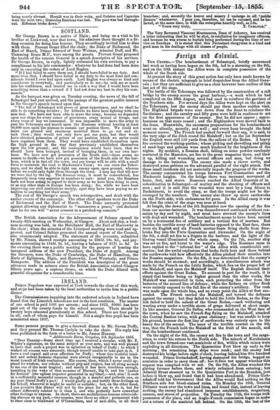SCOTLAND.
Sir George Brown is a native of Elgin; and being on a visit to his brother at Linkwood, near that town, his admirers there thought it a fit- ting occasion for doing him honour. They accordingly invited him to dine with them. Provost Grant filled the chair ; the Duke of Richmond, the Earl of March, Prince Edward of Saxe Weimar, Admiral Duff, and Mr. Cumming Bruce M.P., were among the guests. Provost Grant proposed the health of the veteran General in a speech descriptive of his services. Sir George Brown, in reply, lightly estimated his own services, to pay a compliment to his late commander : whatever he had done had been done only in executing the orders of Lord Raglan.
" If I had failed to carry them out, I should have failed in my duty. And more than that, I should have failed in my duty to the most kind and con- siderate friend I ever had upon earth. Lord Raglan was always so kind and considerate to everybody, and particularly so to me—he took me so much into his confidence, and treated me in such a way that I would have been something worse than a coward if I had not done my beat to obey his com- mands."
As the banquet was given on Tuesday evening, the news of the fall of Sebastopol had just arrived, and the passage of the greatest public interest in Sir George's speech turned upon that.
" The fall of Sebastopol will prove of great importance, and we shall be able to do something decisive ; for hitherto we have been fighting with one
arm tied. We have not been able to move the army, because we depended
upon our ships for every ounce of provisions, every morsel of forage, and every truss of hay we consumed. It was impossible to move the army to
pass the Tchernaya and march upon the Russians without leaving at least
90,000 men upon the plateau to sustain our position there. We could not leave our ground and enormous materiel there to go out and at- tack them ; they would not only have got our guns, but they would have obtained possession of points of our position which we never could have regained from them. They would have established themselves upon
the high ground in the way they previously established themselves
upon the low ground ; and the consequence would have been, that we should have been besieged, instead of besieging them, in our own har- bour. We have now got possession of the South side—there seems no reason to doubt—we have now got possession of the South side of the har- bour, which is in fact all the town, and our troops will be able with a small force to maintain the road to Mackenzie's Farm ; we can cross the Tcher- naya, and we shall be able to fight our enemy upon open ground, whereas before we could only fight them through the town. I may say that till now we were tied by the leg. The Russian army, it must be remembered, has frequently been very superior in numbers to ours : mind you, the Russians have not been acting in regard to their army as we have been doing to ours, or as any other state in Europe has been doing; for, while we have been improving our civil institutions mainly, egad they have been paying no at- tention to anything but their army."
The rest of Sir George's speech was retrospective, and dealt with the earlier events of the campaign. The other chief speakers were the Duke of Richmond and the Earl of March. The Duke earnestly protested against allowing any diplomatist to "manoeuvre a peace," and declared that he for one will "never consent to a patched-up concern."
The British Association for the Advancement of Science opened its twenty-fifth meeting on Wednesday, at Glasgow. About mid-day, a busi- ness meeting was held, in the Merchants' Hall, the Earl of Harrowby in the chair ; when the minutes of the Liverpool meeting were read and ap- proved, and Colonel Sabine presented the annual report of the Council, also unanimously adopted. The statement of the accounts, submitted by Mr. Ninths, showed receipts amounting to 2365/. 10s. 8d., and pay- ments amounting to 15481. 9s. ld., leaving a balance of 8171. Is. 8d. In the evening there was a public meeting for the purpose of hearing the inaugural address of the new President, the Duke of Argyll. Among the listeners, were the Duke of Cambridge, the Duke of Hamilton, the Earls of Eglintoun, Elgin, and Harrowby, Lord Wrottesly, and Prince Bonaparte. The address of the President was descriptive of the great advances made in science since the British Association visited Glasgow fifteen years ago ; a copious theme, on which the Duke dilated with graceful eloquence for a considerable time.


























 Previous page
Previous page